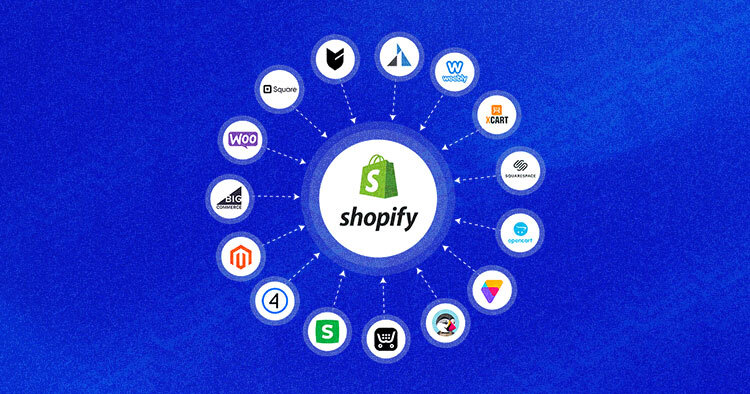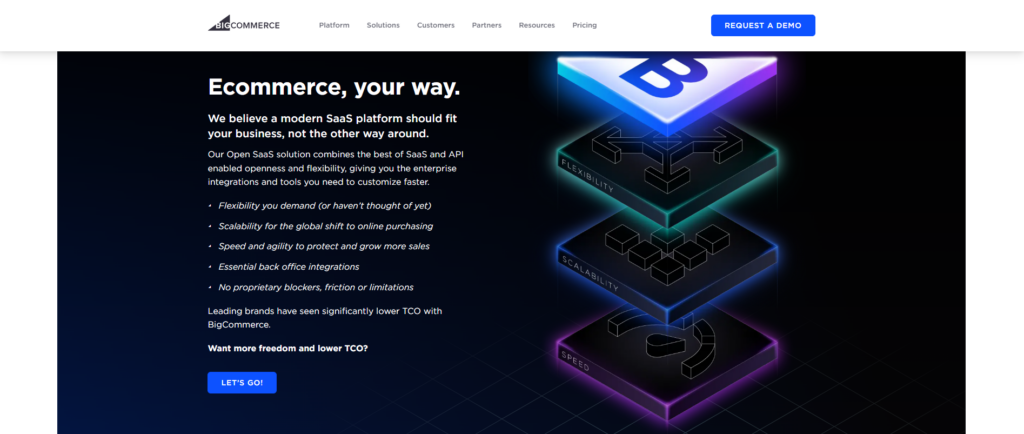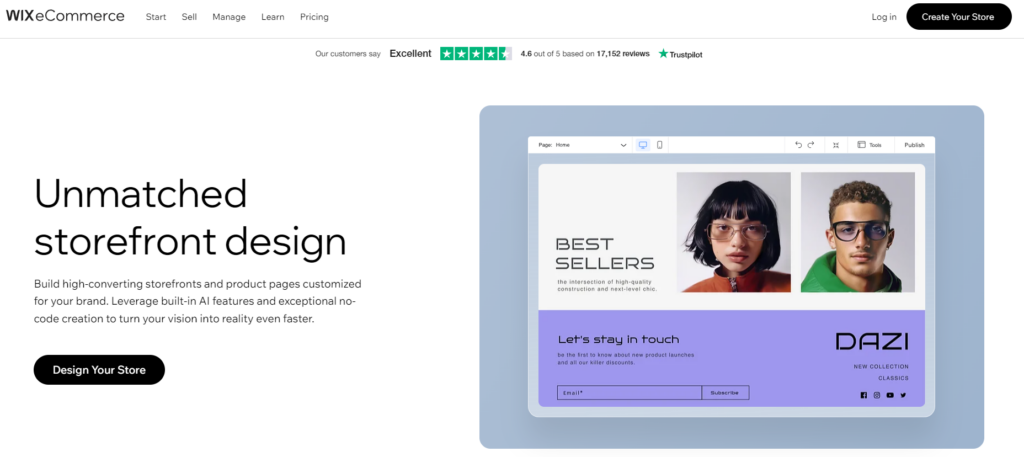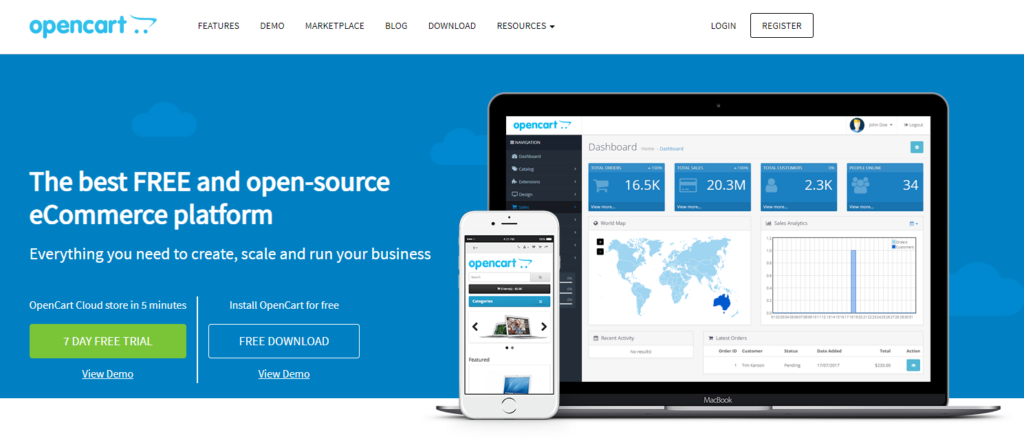With $7.1 billion of total revenue at the end of 2023, Shopify has been one of the leading eCommerce platforms for selling products online. However, according to Statista, Woocomerce was the top eCommerce platform in 2023, with 38.74% of the eCommerce market share. So, as we can see, many Shopify competitors can beat them because of their price or features. Now, let’s discover if Shopify is still worth using and take a look at the top 5 Shopify competitors for building online stores.
Is Shopify still worth it?

In the first- quarter of the 2024 financial report, Shopify increased 23% compared to the same period last year, reaching $1.9 billion. So, Shopify remains one of the best options to build an online store for small and medium businesses. Taking a quick look at Shopify Reviews, it offers a user-friendly interface, drag-and-drop features, and a hundred Shopify apps to expand your store.
Moreover, if you are a dropshipper, Shopify is still a good choice for selling products without stock inventory. Shopify dropshipping will make it easier to engage a large number of potential customers by setting up a performance-based Shopify strategy. Moreover, with a high Shopify SEO score, your store can be displayed at the top of search results.
As a result, Shopify is still worth considering for your budget and the technical requirements of building an eCommerce store. However, if you still want to look for a Shopify alternative with similar functionality or a lower price, let’s discover the top Shopify competitors below.
Top 5 Shopify Competitors for building an Online Store
BigCommerce

BigCommerce provides a similar solution to Shopify, creating an online store via some steps. It’s an all-in-one solution that helps small and large businesses aim for high sales volume with a robust suite of built-in features. While it might require a touch more technical know-how than Shopify, BigCommerce’s strength lies in its ability to handle large product catalogs and complex sales operations, making it a powerful platform for established businesses aiming for significant growth.
According to the 2023 BigCommerce financial report, the total revenue for the fourth quarter was valued at $84.1 million and reached $80.4 million at the end of the first quarter of 2024. As you can see, BigCommerce holds a respectable share of the eCommerce market, becoming one of the major Shopify competitors.
BigCommerce offer various price based on your budgets and requirements
- Standard: $39/month
- Plus: $105/month
- Pro: $399/month
- Enterprise: Custom price
All plans offer a 15-day trial before submitting the full price.
Wix eCommerce

One of the other Shopify competitors that I recommend to you is Wix eCommerce. It is a user-friendly solution that offers a drag-and-drop tool and over 500 templates for building an online website. With Wix, you don’t need any specialized technical skills or coding knowledge to develop your store. Wix Ecommerce prioritizes ease of use and affordability, making it ideal for beginners or businesses launching their first online store.
According to recent research, in 2023, Wix held 43% of the global website builder market share and 19% of the hosted solution market share in the US. If you’re deciding between platforms, comparing Wix vs Shopify can help you determine which is the best fit for your business needs. According to the Wix financial report, the total 2023 revenues, valued at $1.56 million, increased by 13% compared to 2022. As a result, Wix is considered as one of the formidable Shopify competitors.
Wix pricing plan:
- Light: $17/month
- Core: $29/month
- Business: $36/month
- Business Elite: $159/month
WooCommerce

Unlike the standalone solution, WooCommerce is an open-source eCommerce plugin for WordPress that allows you to create a fully functional online store. WooCommerce boasts impressive flexibility, allowing deep customization of your store’s design and functionality through plugins and extensions. It is also considered user-friendly because it doesn’t require a complex IT infrastructure or coding to begin.
As we mentioned in the beginning, WooCommerce has become the top eCommerce platform since 2024, with a 38.74% market share and over 3.33 million sites. So, WooCommerce is one of the big Shopify competitors that you can refer to.
To start building an online store, you need to refer to some essential costs, such as:
- Hosting cost: $5 – $15 per month
- Domain: $10 per year
- WordPress themes and plugins: Free or from $50 to $150 per year
Adobe Commerce (Magento)

While Shopify excels in ease of use, Adobe Commerce (formerly Magento) is an open-source eCommerce platform catering to the other end of the spectrum: established businesses with high-volume sales and complex needs. It allows merchants to create and manage B2B and B2C online stores with various functionalities, features and customization options.
According to Builtwith, Magento gets 8% of the eCommerce usage distribution term, with over 250,000 merchants creating online stores. Moreover, this platform holds 22.3% of the leading eCommerce platform market share in 2024.
To start building an eCommerce store with Magento, one of the Shopify partners, you need to have in-depth knowledge of developing languages such as CSS, HTML, or PHP. Besides, there are many costs and prices you should be aware of, including:
- Website development costs
- Agency: $25/hour
- Freelancer: $10/hour
- In-house team: $60,000/year
- Magento themes cost: Free to $200+
- Domain cost: $10-$500
- Hosting: From $40/month
- And others
OpenCart

One of the other Shopify competitors that offers a free and open-source platform solution for businesses that we want to recommend is OpenCart. This platform provides a free license and the freedom to modify the source code for users who know the technical. However, this added responsibility is rewarded with extensive customization options and a cost-effective approach to building your online presence.
OpenCart gain 0.11% of the eCommerce platform market share in 2024 and have over 223K live stores as of now. Although the market share of OpenCart is smaller than that of Shopify, if you need an option that can modify the source code for free, let’s try it.
Choosing the right Shopify Alternatives for your business
Choosing the right eCommerce platform to build an online store is the first step to success. Because it will impact everything during the operation, from ease of use and design flexibility to security and scalability. Considering factors like your technical skills, product volume, and budget is crucial. Research different platforms, compare features, and explore free trials to find the one that best suits your needs. Don’t be afraid to delve into user reviews and online communities to gain real-world insights. By carefully evaluating your options, you’ll lay the groundwork for a thriving online business.
Conclusion
Besides Shopify, you can choose various alternatives to create an online business and sell products to your customers that meet your budgets and requirements. Explore Shopify competitor options such as BigCommerce for high-volume stores, Wix Ecommerce for user-friendly creation, WooCommerce for WordPress integration, and even OpenCart for a budget-friendly, customizable approach. Dive deeper and discover the perfect platform to launch and grow your unique online business.
